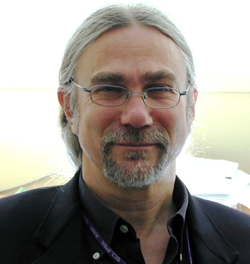Dr. Stephen Minger
The BBC reported in UK human embryonic stem cell first that
“Human embryonic stem cells have been grown in the UK for the first time, a team at King’s College London announced Wednesday…Dr Stephen Minger, one of the lead scientists on the King’s project, told the BBC: ‘The things we’re most interested in are Type 1 diabetes and Parkinson’s disease.
‘We already know that putting cells into patients with those diseases works but there’s a significant shortage of transplantable material.
‘So our idea is to try to change these cells specifically into cells that make dopamine or cells that make insulin’, he said.”
Dr. Stephen Minger is the Director of the Stem Cell Biology Laboratory and a Senior Lecturer in the new Wolfson Centre for Age-Related Disorders at King’s College London. He received his BA in Psychology from the University of Minnesota and his PhD in Pathology (Neurosciences) in 1992 from the Albert Einstein College of Medicine, where he studied with Professor Peter Davies, Resnick Professor of Alzheimer’s Disease Research. From 1992–1994, he was a post-doctoral fellow in the laboratory of Professor Fred Gage, University of California, San Diego, where he first began to pursue research in neural stem cell biology. Additional post-doctoral training was obtained at the University of Kentucky.
In 1995, Stephen was appointed an Assistant Professor in Neurology at The University of Kentucky Medical School. He moved his stem cell research programme to Guy’s Hospital, London in 1996 and was appointed a Lecturer in Biomolecular Sciences at King’s College London in 1998. Over the last 13 years, his research group has worked with a wide range of somatic stem cell populations, as well as mouse and human embryonic stem (ES) cells. In 2002, together with Dr. Susan Pickering and Professor Peter Braude, Stephen was awarded one of the first two licenses granted by the Human Fertilisation and Embryology Authority for the derivation of human ES cells. His group subsequently generated the first human embryonic stem cell line in the UK and was one of the first groups to deposit this into the UK Stem Cell Bank. They have gone on to generate three new human ES cell lines, including one that encodes the most common genetic mutation resulting in Cystic Fibrosis.
In addition to the derivation of human ES cell lines, the Stem Cell Biology Laboratory is focused on the generation of a number of therapeutically relevant human somatic stem cell populations from embryonic stem cells. These include cardiac, vascular, retinal, and neural stem/progenitor cell populations, pancreatic β-cells and oligodendrocyte progenitors. Stephen has established highly productive collaborations with a number of specialist groups in many areas of clinical interest throughout the UK, and is one of the co-organizers of the London Regenerative Medicine Network, a grass roots, research-led organization designed to stimulate clinical translation of cell- and gene-based therapies within London.
The UK Medical Research Council, Juvenile Diabetes Research Foundation International, The Wellcome Trust, and Diabetes UK are some of the many organizations who fund his research.
Stephen is Senior Editor of Regenerative Medicine, a new journal launched January 2006, focused on stem cells, tissue engineering, gene therapy and clinical translation of new emerging biological therapies.
Read his LinkedIn profile.
